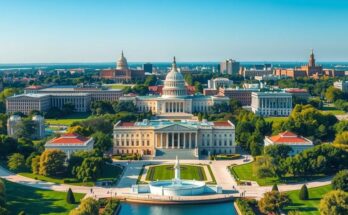In 2024, South Africa’s economy recorded its lowest growth rate in four years at 0.6%, influenced by logistical challenges, weak consumer spending, and drought conditions. Only three sectors contributed positively, with finance and utilities showing resilience. Despite a hopeful growth forecast for 2025 at 1.7%, significant socio-economic challenges remain, necessitating stronger economic strategies.
South Africa’s economy has reached its slowest growth rate in four years, recording only 0.6% expansion in 2024 as reported by Statistics South Africa. This stagnation can largely be attributed to various factors including logistical constraints, diminished consumer spending, drought conditions, and a decline in fixed investment.
However, the South African rand demonstrated some resilience, trading 0.5% stronger at 18.5210 against the US dollar. Investors are closely monitoring the upcoming budget plan from Finance Minister Enoch Godongwana, scheduled for March 12. This plan aims to support economic growth following the rejection of a prior proposal to increase the value-added tax by 191 billion rand over the next three years.
Among the ten economic sectors, only finance, personal services, and electricity, gas, and water showed positive contributions to growth at rates of 3.5%, 1.7%, and 3.5% respectively. Notably, Eskom Holdings SOC Ltd., the state utility, notably improved its performance, positively impacting electricity growth in the last nine months of the year.
In contrast, agriculture and trade experienced significant downturns, contracting by 8% and 1.4% respectively, while gross fixed capital formation suffered a 3.7% decline, representing its poorest performance since the pandemic. Looking forward to 2025, consumption-led growth is anticipated, supported by increasing demand and sectoral reforms within energy and rail.
IndexBox suggests that an accelerated growth trajectory in 2025 is likely due to improved industrial activity and increased investment. Initial reforms and interest rate adjustments have begun to revitalize consumer spending, as evidenced by a 17.2% growth in agriculture and a 1.1% rise in finance during the fourth quarter of 2024. Furthermore, household consumption expenditure increased by 1%, contributing to the overall GDP growth of 0.6% in the last quarter of 2024.
Despite these optimistic projections, the predicted 1.7% growth for 2025 may not be adequate to alleviate the high unemployment and poverty levels. This growth remains well below the 3% target required by the ruling coalition to address pressing socio-economic challenges effectively. Thus, a more comprehensive economic strategy will be essential following the 2024 elections to drive sustainable growth and improvements in living conditions.
In summary, South Africa’s economy is facing serious challenges with a recorded growth of merely 0.6% in 2024, its lowest in four years. While certain sectors are performing well, others are detracting from overall growth. Optimistically, 2025 may present an opportunity for recovery driven by consumer spending and necessary economic reforms, but achieving meaningful improvement in unemployment and poverty requires further strategic efforts. Conclusively, the nation’s future economic policies post-elections will be crucial in addressing these socio-economic issues and fostering growth toward the targeted thresholds.
Original Source: www.indexbox.io




